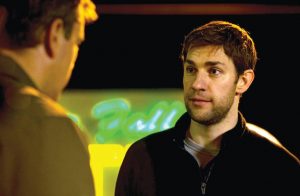 A small town in southwestern Pennsylvania is the setting of Promised Land. It’s not exactly flowing with milk and honey—it’s a broke, fading farm community. But it’s sitting on oceans of natural gas, so two corporate agents, Steve (Matt Damon) and Sue (Frances MacDormand) descend on the all-too-eager locals, offering what seems like a fortune in return for drilling rights.
A small town in southwestern Pennsylvania is the setting of Promised Land. It’s not exactly flowing with milk and honey—it’s a broke, fading farm community. But it’s sitting on oceans of natural gas, so two corporate agents, Steve (Matt Damon) and Sue (Frances MacDormand) descend on the all-too-eager locals, offering what seems like a fortune in return for drilling rights.
Said rights, in this case, mean hydraulic fracturing or “fracking,” extremely deep drilling aided by the injection of chemically enriched water, in order to release gas from beneath otherwise impenetrable rock.
It’s a highly controversial technique, on the one hand suspected of polluting water tables—sometimes resulting in flammable water!—killing crops and livestock, and other environmental blight, but prized on the other hand for its promise of increased freedom from foreign oil.
A local schoolteacher (Hal Holbrook) raises concerns at a town meeting, and Steve and Sue’s deal—and Steve’s big promotion—are endangered.
Their headache is increased by Dustin (John Krasinki), an engaging fellow who shows up in town with tales of fracking’s horrors, to which the townies, much to Steve and Sue’s fury, are clearly listening.
Scripted by Damon and Krasinski from a story by Dave Eggers, and directed by Gus Van Sant, Promised Land is a great-looking movie. Rather than focusing on the economic bleakness of the town, the cinematographer, Linus Sandgren, emphasizes the verdant beauty of the Pennsylvania countryside, suggesting what these people stand to lose in return for corporate chump change.
Van Sant’s touch is low-key and, as always, tinged with good-natured comedy, as is the acting, especially in the familiar bickering affection between Steve and Sue.
There’s also an agreeable love interest for Damon—and maybe Krasinski as well—in the form of Rosemarie DeWitt as an attractive elementary school teacher, smiling with amusement at what a sitting duck she is for these out-of-town boys.
Also built into the material is a plot twist, and while it’s fairly cunning, I couldn’t decide if it helped or weakened the movie.
Something weakens it, in any case: it’s watchable and inoffensive, but somehow it doesn’t deliver. While fracking is certainly made to seem reckless, the movie doesn’t work up that much of a lather about it, and it makes the point that if it isn’t natural gas, it’s going to be oil or coal (the idea of decreased consumption is dismissed).
The real point, though, seems to be that the people who do this sort of unsavory work for energy (or tobacco, or pharmaceutical, or whatever) companies aren’t moustache-twirling villains; they’re likable folks trying to get ahead.
Anyone who found this surprising would have to be naïve—and if they drive a gasoline-powered car or buy a fast-food hamburger, or for that matter type a movie review on a computer plugged into an electric socket, they’d have to be hypocritical, as well.
Still, there’s a difference, even if it’s only a slight difference, between using pernicious or questionable technology because it’s most of what’s viably available and actually participating in perpetuating that status quo.
Steve and Sue are pleasant, even endearing, but that doesn’t mean they aren’t doing what they’re doing, and Damon, Krasinski and Van Sant can’t seem to find a way to confront this dramatically without turning Promised Land sanctimonious.
So they don’t quite confront it. They just let the gas leak out of the movie, with a mild, unconvincing sigh.
[the_ad_placement id="below-menus"]
‘Promised Land’
[the_ad_placement id="bottom-post"]

